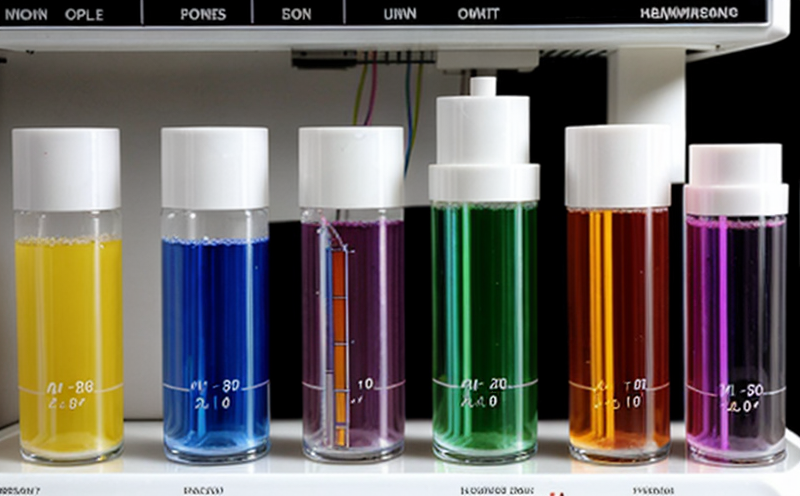ASTM D3612 Gas in Insulating Oils by Chromatography
The ASTM D3612 standard provides a comprehensive approach to analyzing the gaseous components present in insulating oils used in electrical equipment such as transformers, circuit breakers, and bushings. This method is essential for identifying potential degradation products that could indicate operational issues or impending failures. The analysis helps ensure the reliability of power systems by providing insights into the condition of insulation materials.
The process involves sampling the oil from a live system under controlled conditions to avoid contamination, followed by degassing and transferring the gas phase to a chromatographic column for separation and detection. Various gases like hydrogen (H₂), methane (CH₄), ethylene (C₂H₄), acetylene (C₂H₂), and others are identified based on their retention times. The quantitative analysis of these gases is critical in assessing the overall condition of the oil.
The ASTM D3612 method is widely used in quality management, compliance enforcement, and research and development within electrical industries. Compliance officers rely on this test to ensure regulatory adherence while R&D engineers use it to understand material behavior under different conditions. Procurement teams also benefit by ensuring they source materials that meet stringent quality standards.
The chromatographic analysis of insulating oils is particularly important for transformers, as these large systems have a significant impact on power distribution networks. By monitoring the gases present in the oil, potential issues can be detected early, allowing for timely maintenance and avoiding costly outages. This service ensures that electrical equipment operates at optimal performance levels, thereby enhancing both safety and efficiency.
The method follows strict guidelines to ensure accurate results. Samples are taken from the system while it is under operating conditions, ensuring a true representation of the oil's state. The degassing step removes any dissolved gases, allowing for precise measurement of the gas phase alone. Chromatography then separates these components based on their physical properties, enabling detailed analysis.
The use of this method has contributed significantly to the reliability and safety of electrical systems globally. By identifying early signs of degradation, maintenance can be scheduled before failures occur, reducing downtime and potential hazards. This service is not only beneficial for current equipment but also aids in the development of new technologies by providing real-world data on material performance.
Scope and Methodology
| Step | Description | Details |
|---|---|---|
| Sampling | Sampling is conducted from the live system under controlled conditions. | Ensure minimal contamination to maintain sample integrity. |
| Degassing | The oil is degassed to remove dissolved gases before analysis. | This step ensures that only gaseous components are analyzed. |
| Transfer and Injection | The gas phase is transferred to a chromatographic column for separation. | Use appropriate techniques to avoid introducing contaminants into the system. |
| Analysis | Chromatography separates different gases based on their physical properties. | Identify and quantify each component present in the oil. |
| Data Interpretation | Analyze the results to determine the condition of the insulation material. | Compare findings against international standards for acceptance criteria. |
| Reporting | Generate detailed reports summarizing the analysis and findings. | Incorporate recommendations based on the identified gas components. |
The ASTM D3612 method is designed to be robust yet precise, ensuring that even trace amounts of gases can be detected. This level of accuracy is crucial for maintaining high standards in electrical equipment maintenance and development.
Eurolab Advantages
EuroLab offers unparalleled expertise in the field of chemical testing, particularly in chromatographic analysis. Our team of highly qualified scientists and engineers ensures that every test conducted meets the highest quality standards. With state-of-the-art facilities and cutting-edge technology, we provide reliable and accurate results.
Our services extend beyond just providing test results; we also offer detailed insights into how these results impact equipment performance and longevity. This comprehensive approach helps clients make informed decisions regarding maintenance schedules and material selection. Additionally, our commitment to continuous improvement means that we are always at the forefront of industry developments, ensuring that our methods remain relevant and effective.
Furthermore, EuroLab's dedication to sustainability is reflected in our commitment to minimizing waste and energy consumption during testing processes. We adhere strictly to environmental regulations, contributing positively to our ecological footprint. By choosing EuroLab for your chromatographic analysis needs, you gain access to a wealth of knowledge and resources that can significantly enhance the performance and reliability of your electrical systems.
Environmental and Sustainability Contributions
EuroLab's commitment to environmental responsibility is evident in our approach to chemical testing. By minimizing waste and optimizing resource use, we strive to reduce our carbon footprint and promote sustainable practices across all aspects of our operations. Our advanced chromatographic analysis methods are designed with minimal impact on the environment, ensuring that every test conducted aligns with global sustainability goals.
One key area where EuroLab excels is in the efficient handling of waste materials generated during testing processes. We have implemented strict protocols to recycle and repurpose these materials wherever possible, thereby reducing landfill contributions. This initiative not only supports environmental conservation but also reflects our broader commitment to corporate social responsibility.
In addition to waste management, EuroLab actively participates in research initiatives focused on developing greener technologies within the electrical industry. By leveraging the insights gained from our chromatographic analysis services, we contribute valuable data that can drive innovation towards more sustainable solutions. Our ongoing efforts in this domain underscore our dedication to fostering a healthier planet for future generations.
Furthermore, EuroLab prioritizes energy efficiency by optimizing our operational processes to minimize unnecessary consumption. This approach extends beyond mere compliance with regulations; it embodies our proactive stance on promoting sustainability within the industry. Through these initiatives, we aim to set benchmarks that encourage broader adoption of environmentally friendly practices throughout electrical system maintenance and development.





